Coconut oil
INCI: Cocos Nucisfera Oil
CAS No.: 8001-31-8
EC No: 232-282-8
It is extracted from the coconut meat by pressing.
refined coconut oil
Grade: Cosmetic
Specification:
Acidity (Lauric) % <0.2
Acid value mg KOH/g <0.4
Humidity and Impurities % <0.1
Saponification Value mg KOH/g 250-265
Iodine Index g I2/100 g 7-12
Color Gardner <2
Peroxide Index meq O2/Kg <5
Melting Point ºC 24-27
Carbon number-Fatty Acid-Specification
C 8 CAPRYLIC / Caprylic % 4-10
C 10 CAPRIC / Capric % 3-8
C 12 LAURIC / Lauric % 42-53
C 14 MYRISTIC / Myristic % 16-21
C 16 PALMITIC / Palmitic % 7-12
C 18 STEARIC / Stearic % 2-5
C 18:1 OLEIC / Oleic % 5-11
C 18:2 LINOLEIC / Linoleic % 1-4
Coconut oil is obtained from the meat of the coconut. The oil is obtained by pressing and a subsequent process of refining, bleaching and deodorization. This pulp has an oil content of 60-70%.
Coconut is obtained from the coconut tree (Coco Nucifera) and the main producers are Indonesia and the Philippines. It is an oil with a high melting point, from 25ºC it begins to melt, which is why it is also considered a vegetable fat. It is marketed mainly refined and under normal temperature conditions of 25ºC it is a creamy white and opaque mass.
It is an oil rich in saturated fatty acids, close to 90%. More than 50% of its fatty acids are short-chain (less than or equal to 12 carbons, lauric), which is why, together with palm and palm kernel oil, it is known as an oil from the lauric family. It is the oil with the highest content of caprylic fatty acid, up to 10%. It is precisely this high content of short-chain fatty acids that makes it highly appreciated by manufacturers in the detergent, surfactant and cosmetics sectors. It is one of the most versatile oils with wide applications in the technical and personal care sectors.
Did you know that there is a natural ingredient that can transform your personal care routine in amazing ways? Imagine a unique solution for your skin and hair that deeply hydrates, nourishes and softens. Read on to discover the secret behind the incredible popularity of Coconut Oil in natural cosmetics.
Coconut Oil in Natural Cosmetics: Hydration and Nutrition in its Pure State
Coconut Oil, obtained from coconut meat through a delicate cold pressing process, is one of the most precious treasures in the production of handmade soaps, natural cosmetics and handmade candles. Its versatility and the countless benefits it brings to the skin and hair make it an essential ingredient in your beauty pantry.
Coconut Oil Properties
Coconut Oil stands out for its moisturizing, nourishing and softening properties that significantly improve the health and appearance of skin and hair. Its fatty acids and natural antioxidants work in harmony to give you amazing results.
Hydration and Nutrition for Radiant Skin
Coconut Oil acts as a natural humectant, trapping moisture in the skin and forming a protective barrier. This helps prevent water loss, leaving skin hydrated, soft and supple. In addition, its essential fatty acids deeply nourish, providing a radiant and healthy appearance.
Revitalized and Shiny Hair
Do you dream of beautiful hair full of vitality? Coconut Oil is your perfect ally. Its penetrating and nourishing properties reach the hair fiber, repairing dry and damaged hair from the inside out. Enjoy soft, shiny and strengthened hair, with a noticeable reduction in frizz and split ends.
Coconut Oil Benefits for All Skin and Hair Types
Coconut Oil is suitable for a wide variety of skin and hair types. Here's how it can benefit each:
Skin Types and their Benefits
- - Dry skin: Coconut Oil deeply hydrates, restoring softness and flexibility.
- - Sensitive skin: Its soothing and softening properties reduce irritation and redness.
- - Mature skin: Helps improve firmness and reduce wrinkles, leaving a more youthful appearance.
- - Skin with acne: Its antimicrobial properties help control acne and reduce inflammation.
Hair Types and their Benefits
- - Dry and damaged hair: Nourishes and repairs hair, restoring its vitality and elasticity.
- - Curly or frizzy hair: Defines curls, controls frizz and adds shine.
- - Dry scalp: Relieves dryness, itching and flaking, maintaining a healthy balance.
Explore the Possibilities of Use and Combinations
The versatility of Coconut Oil in natural cosmetics has no limits! You can use it to make a wide range of personalized products. Here are some ideas and recommended doses:
Make your own products
- - Body products (creams, lotions): Use between 5% and 20% Coconut Oil in the formula.
- - Facial products (creams, balms): We recommend a concentration of Coconut Oil between 1% and 10%.
- - Hair products (conditioners, masks): Incorporate between 1% and 5% of Coconut Oil in the mixture.
Perfect Combinations
Coconut Oil also blends beautifully with other vegetable oils to enhance its benefits. Here you have three options:
- - Argan Oil: Deep hydration and nutrition for radiant skin and hair.
- - Avocado Oil: Restores and strengthens the vitality of dry and damaged hair.
- - Grape Seed Oil: Moisturizing and antioxidant balance for healthy skin and shiny hair.
FREQUENT QUESTIONS
Why do soaps with coconut oil lather more?
Soaps with coconut oil lather more due to the presence of special fatty acids in the oil, such as lauric acid. These fatty acids act as surfactants that reduce the surface tension of the water, allowing the formation of air bubbles and, therefore, a rich foam.
Why are coconut oil soaps harsher?
Coconut oil soaps are harder because coconut oil contains saturated fatty acids, such as lauric acid, which form solid salts during the saponification process. These solid salts contribute to the hardness of the soap, making it more durable and resistant to water.
What does lauric and caprylic acid have to do with the quality of coconut oil?
Lauric and caprylic acids present in coconut oil are beneficial fatty acids that provide antimicrobial, moisturizing and softening properties. Their presence in coconut oil can influence its quality and effectiveness in natural cosmetics, since they contribute to its ability to fight bacteria, hydrate the skin, and soften it.
What are the differences between refined coconut oil and virgin coconut oil?
Refined coconut oil has gone through a refining process that includes bleaching and deodorization to remove strong flavors and odors. On the other hand, virgin coconut oil is obtained by cold pressing and does not undergo refining processes. Also, refined coconut oil tends to have a more neutral taste and odor, while virgin coconut oil retains its natural flavor and aroma.














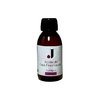
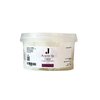
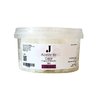

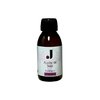
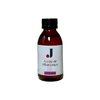
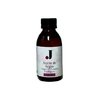
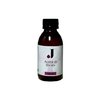
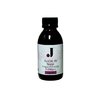
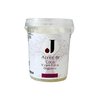
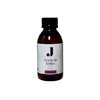
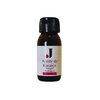
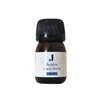
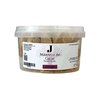

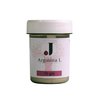
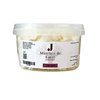
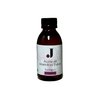
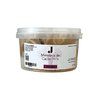
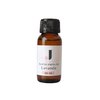
 tienda@ladespensadeljabon.com
tienda@ladespensadeljabon.com  Location
Location (+34 ) 944 657 841
(+34 ) 944 657 841




 (+34 ) 608 651 314
(+34 ) 608 651 314